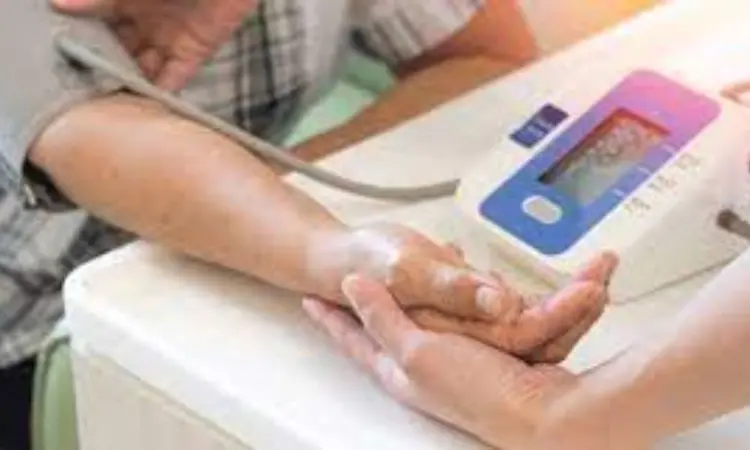- Home
- Medical news & Guidelines
- Anesthesiology
- Cardiology and CTVS
- Critical Care
- Dentistry
- Dermatology
- Diabetes and Endocrinology
- ENT
- Gastroenterology
- Medicine
- Nephrology
- Neurology
- Obstretics-Gynaecology
- Oncology
- Ophthalmology
- Orthopaedics
- Pediatrics-Neonatology
- Psychiatry
- Pulmonology
- Radiology
- Surgery
- Urology
- Laboratory Medicine
- Diet
- Nursing
- Paramedical
- Physiotherapy
- Health news
- Fact Check
- Bone Health Fact Check
- Brain Health Fact Check
- Cancer Related Fact Check
- Child Care Fact Check
- Dental and oral health fact check
- Diabetes and metabolic health fact check
- Diet and Nutrition Fact Check
- Eye and ENT Care Fact Check
- Fitness fact check
- Gut health fact check
- Heart health fact check
- Kidney health fact check
- Medical education fact check
- Men's health fact check
- Respiratory fact check
- Skin and hair care fact check
- Vaccine and Immunization fact check
- Women's health fact check
- AYUSH
- State News
- Andaman and Nicobar Islands
- Andhra Pradesh
- Arunachal Pradesh
- Assam
- Bihar
- Chandigarh
- Chattisgarh
- Dadra and Nagar Haveli
- Daman and Diu
- Delhi
- Goa
- Gujarat
- Haryana
- Himachal Pradesh
- Jammu & Kashmir
- Jharkhand
- Karnataka
- Kerala
- Ladakh
- Lakshadweep
- Madhya Pradesh
- Maharashtra
- Manipur
- Meghalaya
- Mizoram
- Nagaland
- Odisha
- Puducherry
- Punjab
- Rajasthan
- Sikkim
- Tamil Nadu
- Telangana
- Tripura
- Uttar Pradesh
- Uttrakhand
- West Bengal
- Medical Education
- Industry
Single injection of zilebesiran effective in lowering BP for six months in hypertension patients: KARDIA-1 trial

USA: New data from the KARDIA-1 Phase 2 study showed that a single injection of the investigational antihypertensive agent zilebesiran was effective in lowering blood pressure (BP) in adults with mild to moderate hypertension for up to 6 months. The findings were presented on November 11 at the American Heart Association (AHA) Scientific Sessions 2023, held in Philadelphia.
"Our study showed that either quarterly or bi-annual doses of zilebesiran can safely and effectively lower BP in patients with uncontrolled hypertension," according to senior study investigator George Bakris, a professor of medicine and director of the Comprehensive Hypertension Center at the University of Chicago Medicine.
Zilebesiran is an investigational RNAi therapeutic targeting liver-expressed angiotensinogen (AGT) in development for the treatment of patients with hypertension and high cardiovascular (CV) risk.
Uncontrolled hypertension is a leading cause of mortality and morbidity. Many adults with hypertension are untreated despite the availability of effective antihypertensives, and up to 80% have uncontrolled disease, both globally and in the United States.
Zilebesiran is a subcutaneous RNA interference (RNAi) therapeutic that binds to the hepatic asialoglycoprotein receptor with high affinity, resulting in a reduction in the synthesis of angiotensinogen, the sole precursor of all angiotensin peptides. It is suggested that its hepatocyte-targeted delivery may allow the preservation of extrahepatic angiotensinogen expression, which could limit off-target effects in the kidney and other tissues.
The KARDIA-1 trial investigated the efficacy and safety of different zilebesiran doses in patients with mild to moderate hypertension (systolic BP of 135-160 mm Hg), who are untreated or on stable therapy with up to two antihypertensive medications.
The study included 394 patients with average baseline systolic BP of 142 mm Hg. They were randomly assigned to receive one of four different zilebesiran doses (150 mg, 300 mg, or 600 mg once every 6 months or 300 mg once every 2 months) or a placebo. The final analysis included 377 patients (56% men, 25% Black).
The study led to the following findings:
- Over the 6-month follow-up period, there were sustained reductions in serum angiotensinogen (between 88% and 98%).
- Ambulatory systolic blood pressure measured over 24 hours was significantly decreased with all zilebesiran regimens, with a mean reduction from baseline to month 6 of around 10 mm Hg in the three top doses studied and by around 14 mm Hg compared with placebo.
- At 6 months, patients receiving zilebesiran were more likely to achieve 24-hour average systolic blood pressure measurements ≤ 130 mm Hg.
- Participants in all four zilebesiran groups consistently experienced significantly greater reductions in both daytime and nighttime systolic blood pressure.
- There were four nonserious adverse reactions leading to discontinuation in the zilebesiran groups: two instances of orthostatic hypotension, one of injection site reaction, and one of blood pressure elevation.
- Most hyperkalemia adverse events, which occurred in 6% of patients, were mild, did not require intervention, and generally resolved with repeat measurement; none were associated with acute kidney injury or led to study drug discontinuation.
- The incidence of hypotension events was low, and no clinically relevant changes in renal or hepatic function were observed.
- There was one death due to cardiopulmonary arrest in a patient receiving zilebesiran 300 mg every 3 months, but this was not classified as drug-related.
Zilebesiran is being further investigated as an add-on therapy for hypertension treatment in the ongoing KARDIA-2 phase 2 study.
These data further support the potential for biannual or quarterly dosing of subcutaneous zilebesiran in achieving a consistent pharmacodynamic effect and effective BP reduction through 6 months
"These data further support the potential for quarterly or biannual dosing of subcutaneous zilebesiran in achieving a consistent pharmacodynamic effect and effective blood pressure reduction through 6 months," the researchers concluded.
Dr Kamal Kant Kohli-MBBS, DTCD- a chest specialist with more than 30 years of practice and a flair for writing clinical articles, Dr Kamal Kant Kohli joined Medical Dialogues as a Chief Editor of Medical News. Besides writing articles, as an editor, he proofreads and verifies all the medical content published on Medical Dialogues including those coming from journals, studies,medical conferences,guidelines etc. Email: drkohli@medicaldialogues.in. Contact no. 011-43720751


